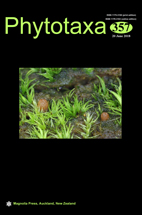Abstract
Studies on microcolonial fungi (MCF) inhabiting limestone formations in the Wyżyna Krakowsko-Częstochowska Upland (Poland) resulted in isolation of Knufia marmoricola. This is the first report of this species in Poland, which was previously known from the Mediterranean basin. Morphological analyses have shown a high variability dependent on used mycological media. Malt extract agar (MEA) proved to be the most suitable medium for morphological observations. Cultivation on potato dextrose agar (PDA) and dichloran rose-Bengal with chloramphenicol medium (DRBC) resulted in growth of mycelium lacking in repetitive diagnostical features. Growth on a synthetic nutrient-poor agar (SNA) medium resulted in flattening of the colonies, decreased melanization and reduction of the colony density. Molecular phylogenetic analyses, based on ITS1-5.8S-ITS2 rDNA sequences, confirmed assignment of Polish isolates to Knufia marmoricola. Nomenclatural clarification of Knufia petricola is presented.

